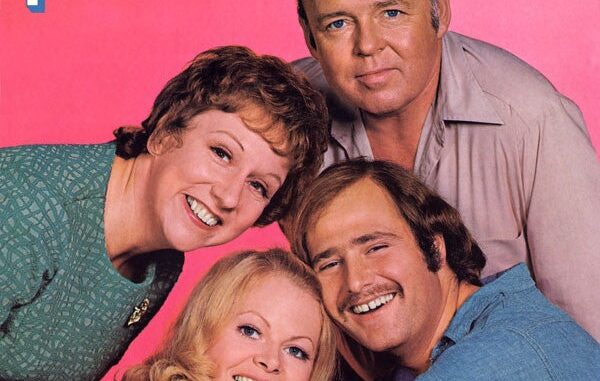
When the new TV show All in the Family premiered on January 12, 1971, viewers were greeted with a peculiar disclaimer, hinting that the show would humorously examine societal flaws, prejudices, and concerns. It wasn’t long before the show made its bold statement with its opening scene, featuring Carroll O’Connor and Jean Stapleton as the Bunker couple, Archie and Edith, performing the nostalgic theme song “Those Were the Days.” The song, evoking the bygone era of Glenn Miller and the Great Depression, set the tone for a show that would juxtapose humor with biting social commentary.
The character of Archie Bunker—portrayed by O’Connor—was an abrasive, beer-guzzling, cigar-smoking working-class man with a troubling array of prejudices. His hateful views, particularly on race and gender, shocked many viewers. He regularly used derogatory terms like “Hebes,” “spics,” and “spades” to describe various minority groups, while simultaneously belittling his wife Edith with cruel nicknames like “silly dingbat” and taunting his son-in-law Mike with the insulting term “meathead.” Archie’s behavior was far removed from the squeaky-clean, idealized characters of previous decades, like those on Father Knows Best or Hee Haw. In fact, CBS was so concerned about the backlash that they prepared extra phone operators to handle the anticipated flood of angry calls. However, to their surprise, only a small percentage of viewers responded negatively, and 15 percent of the audience embraced the Bunkers as part of their weekly routine.
Despite the mixed initial reception, All in the Family quickly made waves, particularly with its exploration of race and class. The show was groundbreaking, showcasing for the first time on mainstream television a character like Lionel Jefferson, played by Mike Evans, who was Archie’s African American neighbor. Lionel’s interactions with Archie highlighted the deep-seated racial prejudices of the time, and the show did not shy away from confronting these issues head-on.
In a country still reeling from cultural shifts and social upheavals, the show captured the nation’s complex political and racial tensions. 1971 had already seen divisive moments like the Hard Hat Riots and the release of the film Joe, which centered on a working-class man’s anger at the counterculture and racial integration. All in the Family was a reflection of these real-world struggles, bringing them into the homes of millions of viewers. The show’s raw, unapologetic approach to topics such as racism, feminism, and the generational divide sparked heated debates across the country.
What was initially seen as a controversial sitcom quickly garnered a dedicated fanbase. Archie Bunker, though unpleasant and bigoted, was portrayed as a deeply human character—one who struggled with personal fears and insecurities. Despite his faults, Archie’s complexity, portrayed with great depth by O’Connor, gave viewers the opportunity to reflect on their own beliefs. His jarring combination of love for his family and hatred for certain societal groups resonated with a segment of the audience, especially blue-collar workers who felt similarly alienated by the rapid changes occurring in the world around them.
As the show’s popularity grew, All in the Family became more than just a TV show—it became a cultural phenomenon. It sparked discussions in classrooms, inspired political commentary, and even caught the attention of President Nixon, who praised Archie Bunker as a representative of the working class. The show’s portrayal of issues like bigotry and sexism provided a lens through which many viewers began to confront their own biases and assumptions.
In many ways, All in the Family was a reflection of its time, but it also helped to shape the future of television. By the end of its first season, the show had already become a national talking point, prompting dialogue about race, gender, and the shifting values of American society. It was a show that didn’t just entertain—it forced its audience to think, reflect, and sometimes, even change.
